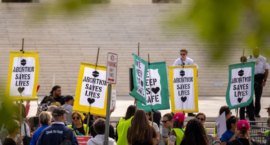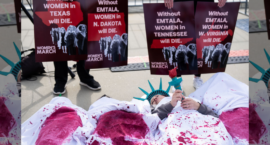In the wake of Dobbs, while most abortion-restrictive states have maintained an exception to preserve the health of the pregnant woman, a handful of ban states—including Idaho—no longer permit abortions needed to protect a pregnant person’s health. The Biden administration says this is in direct conflict with the federal statute EMTALA.
Solicitor General Elizabeth Prelogar encapsulated what Justice Sotomayor referred to as the “big daylight” between the two laws: “In Idaho, doctors have to shut their eyes to everything except death—whereas, under EMTALA, you’re supposed to be thinking about things like: Is she about to lose her fertility? Is her uterus going to become incredibly scarred because of the bleeding? Is she about to undergo the possibility of kidney failure?”












